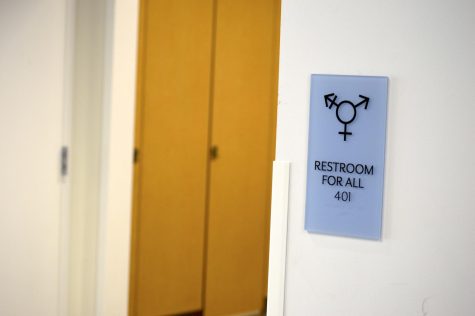Youngkin’s recent transgender policies could cause a lot of harm
October 10, 2022

Every day, thousands of transgender and non-binary students in Virginia are forced to cope with the humiliation that comes with being misgendered, deadnamed, and bullied. New model policies released by Governor Glenn Youngkin’s Department of Education on September 16 could make things even worse.
Model policies are a set of policies that are released by a specific department of the executive branch — in this case, the Virginia Department of Education. These policies dictate how a specific part of a state or country should run.
These policies include a variety of changes to the previous policies, with a special focus on transgender students. The 2021 model policies required teachers to use a students preferred name and pronouns, and overall protected the rights of trans students, therefore decreasing the mental toll on students who are already disrespected in many parts of their life. However, these have been overturned in exchange for new ones — and those policies are anything but inclusive.
Under Youngkin’s new policies, teachers cannot be forced to use a student’s preferred name and pronouns, students must use the bathroom that corresponds to their gender assigned at birth, schools must defer to parents when it comes to how much a kid is allowed to socially transition, and teachers cannot withhold information about a student’s gender identity from their parents. Many believe that the final requirement is the most dangerous, as it could potentially lead to teachers being forced to out students to unaccepting families.
While supporters of these policies believe that parents have the right to know about their children’s lives, and should have the right to make decisions about their lives, some believe this is going too far.
“In high school especially, we are tiny humans, but we are still our own people. I think parents can have a right to know if their kid is doing something dangerous, but your gender identity, who you are, is not something that parents have to know. You should be able to tell them on your own terms,” Felix, a senior who identifies as genderfluid, said.
Misgendering and deadnaming students can invalidate a person’s identity, and can often be dehumanizing. People who have experienced misgendering have compared it to a slap or a pinch. The problem, however, is that this is not something that happens just once or twice, but rather becomes a long-term phenomenon, causing real pain to students.
In the new model polices, students are also required to use the bathroom of their gender assigned at birth, which is hurtful to many transgender students, and further invalidates their gender identity. While Meridian does have gender neutral bathrooms, somewhat diluting the harm that this causes, Meridian isn’t the only high school in Virginia, and not every school offers these accommodations, meaning that this part of the policies could still cause plenty of discomfort to students.
However, these are far from the worst of the policies that came from the Department of Education this week. The most damaging policy is that teachers cannot withhold information about a student’s gender identity from parents.
“Sometimes, school is the only safe environment for people, and these policies have the power to reverse that,” sophomore Cil Smith said.
It is likely that these policies will lead to students being outed to unaccepting parents, which could risk the safety of transgender students. According to the National Library of Medicine, 82% of transgender people have considered suicide, with the highest rates among transgender youth. It also stated these rates were increased in family environments that were unaccepting. Considering these statistics, it is ridiculous to risk a student’s safety, and even life, in the name of the rights of parents. Schools should prioritize their students above all else.
“The idea that [I], as a teacher, would be required to report anything that students are doing to home — that breaks the trust that students have in the adults in the school building,” Ms. Barr, sponsor of the Genders and Sexualities Alliance of Meridian, said.
Students don’t necessarily have to express their gender identity to their teachers and peers, but being in the closet has its own risks. It exposes students to even more misgendering and deadnaming, which, as mentioned earlier, is a dangerous thing to do. It is also a huge mental strain being in the closet, showing even more what a bad idea it is to force students to not express themselves at school.
Some also worry that these policies could be a warning of what is to come, and could encourage a variety of even stricter bans across the nation. If these policies stay in place after the comment period, they could encourage other states to pass similar or even more restrictive bans on the rights of trans people.
“Things are already bad, and they are going to get worse. Considering trends we’ve been seeing in the country — Texas making it illegal for parents to help their child transition, all these laws passing to restrict bodily autonomy, stuff like this to restrict gender expression — I’m really worried that there’s going to be just a massive sweeping restriction on our ability to just do things, and have control over our own bodies,” Felix said.
Thankfully, the Falls Church School Board is fighting against this. They have stated that they do not intend to comply with these policies, and are planning to sue the state on the basis that they have violated the Virginia Human Rights Act. But that is not enough. Those who would like to contribute should send public comments to the Virginia government protesting the policies. In a time like this, it is important to protect the rights of all students, including those who do not conform to our historically-established ideas of gender.








